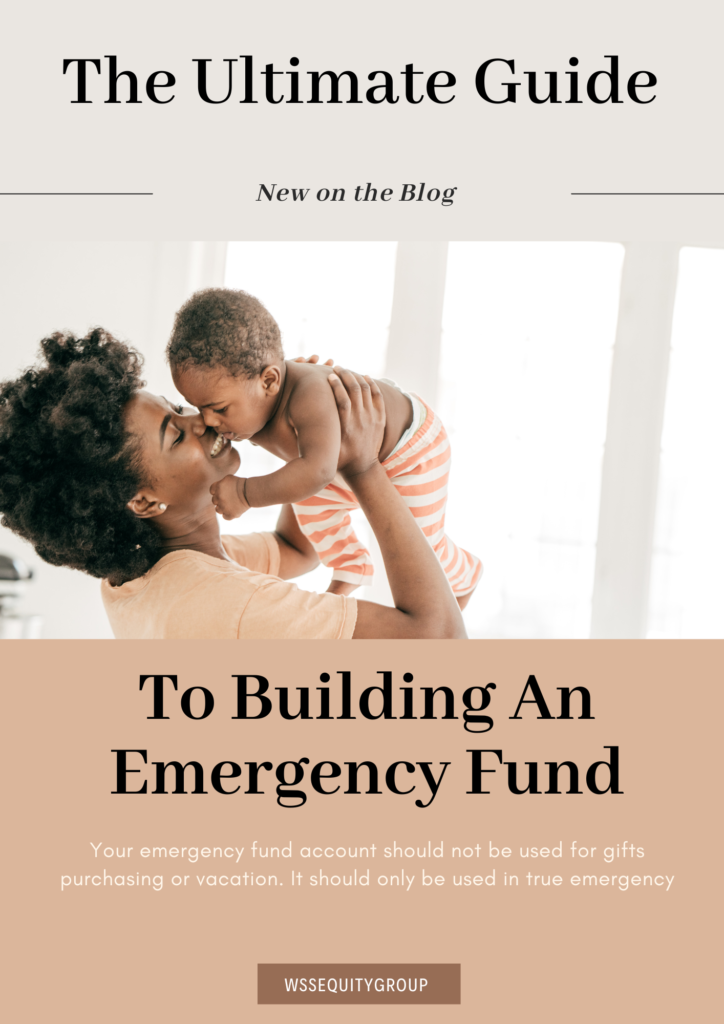
Imagine your car had a major breakdown by the side of the road and now you have no money for its repair for the whole month ahead. If you have auto insurance (and you should) they may offer roadside assistance. Typically this only covers jump-start, gas, or towing. Now you’ll have to ask a friend or family member for some money to repair your car, and you might even get denied a couple of times. That is not something you want to hear in an emergency at all. Keep reading to learn more on the ultimate guide to building an emergency fund.
What Is an Emergency Fund?
An emergency fund is a dedicated savings account that you established over time and have reserved only for emergencies. The money is locked away in a safe place and is not used for your regular everyday expenses. Instead, this fund would be used for unplanned expenses such as a car repair, medical expenses, or the loss of a job, etc.
Everyone Needs an Emergency Fund
The impact of not having an emergency fund in place when a financial crisis occurs could leave a devastating impact on your life. This could take years to recover. Worse, these unplanned financial crises may push you to tap into your retirement savings. This could even caused you to go further into debt. For example, you might now need to use credit cards with high interest rates that could take years to pay off. Begin to create that emergency fund today.
How Much Should You Have Saved? (The Ultimate Guide To Building An Emergency Fund)
The rule of thumb is to build up at least three to six months of your earnings as an emergency fund. Each individual situation is unique. Think of your desired financial well-being and set your goals accordingly. You can naturally build up your emergency funds over time, but you need to remain committed to the goal.
What Steps Do You Need to Take to Create a Fund?
You can use many different approaches to start an emergency fund. The most critical step, however, is to set your desired goals and work that plan all the way through. Once you have established your goals you can begin to utilize several ways to contribute to your emergency fund.
If your job offers direct deposit with the option of multiple accounts this is the most effective way to save. The money would be automatically deposited to your savings account straight from your paycheck. Another great motivator to begin saving towards your emergency fund is to set up automatic recurring deposits. These can be done right from your checking account to your savings account with your bank.
Keep in mind that this emergency fund account should be different from any other savings account you may establish. It should only be used for unplanned expenses that are not a part of your routine monthly bills. As you continue to develop the habit of saving it becomes easier for you to replenish your emergency funds whenever you do use it.
Related Post: 5 Ways to Cut Expenses
Best Place to Keep Your Funds
Quite naturally, the best place to keep your fund is somewhere you can easily access it. Some people keep their funds in a high-interest savings account that churns out a high return each month. This method ensures that your money is not sitting around losing value. Instead, it is earning interest, and you can withdrew the amount whenever you need to.
It is also a good idea to set up online banking so you can monitor the account and its growth. This also serves as a great motivator to continue saving as you see the balance grows and grows.
What’s The Right Time to Use The Fund?
While many people may consider this to be an extremely subjective question, it is not. The emergency fund should be used when you would not be able to carry out life as usual without the resource. If you are an IT specialist your laptop might break down without any indication. If you have a project due, then you use your emergency fund to get your computer repaired or replaced.
Only you know your household situation and what is considered an emergency for you. Be careful to identify between a true emergency and a small inconvenience. The latter can often be resolved without having to use your emergency funds. Ideally, the fund needs only to be used in situations when you cannot shoulder the expenses with your regular earnings. The funds cannot be used for impulse buys and cannot be used for gift purchases. Instead, the funds need to be exclusively reserved for emergencies.
Key Takeaway (The Ultimate Guide to Building an Emergency Fund)
Establishing an emergency fund is a great way to protect yourself and your family from any unforeseen financial crisis.
This is a cash reserve that is set aside for unplanned expenses such as a car repair, home repair, medical expense, or the loss of a job.
Everyone needs an emergency fund since unexpected financial expense could potentially create financial hardship, taking years to recover.
The amount that is ideal for an emergency fund is dependent on each individual situation. The typical rule of thumb is to set aside three to six month of your income in an emergency fund.
However, keep in mind the key takeaway is to start saving since even a small amount can bring tremendous financial security.
Create an established system for making regular contributions, such as direct deposit from your employer or with your bank.

The Ultimate Guide to Building an Emergency Fund…..
Some people like to keep cash on hand for emergencies. While this may be tempting due to its quick accessibility keep in mind that cash can also be stolen or destroyed. It is highly recommended that you keep your emergency funds at a banking institution in a readily accessible account. Especially as institution where your money is federally insured up to $250,000.
Your emergency fund account should not be used for gifts purchasing or vacation. It should only be used in true emergency. Typically unplanned expenses that are not a part of your routine monthly expenses.
Be confident when it is time to use your funds. The goal behind creating an emergency fund is to have money set aside for unseen financial situations. Therefore, do not be afraid when it is time to use your funds. Be proud of yourself instead that you were disciplined to create it in such a time as this.
Once you resolve your unforeseen financial setback begin right away to build your emergency funds back to your desired goal. The financial peace of mind that this brings you and your family is priceless.
Share with us. What are your thoughts on building an emergency fund?
Let us know in the comments below.
Cheers!








